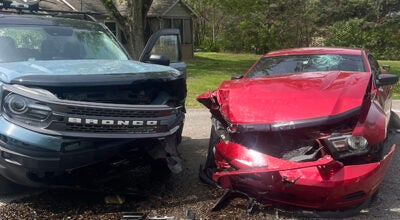Rick Snyder for governor
Published 9:52 pm Monday, July 26, 2010

Rick Snyder in Dowagiac July 26 ahead of the Aug. 3 primary election a week from today. (The Daily News/John Eby)
By JOHN EBY
Dowagiac Daily News
Rick Snyder’s Reinvent Michigan Tour bus brought his “bold vision” to Southwestern Michigan College at high noon Monday.
Snyder doesn’t ask voters to elect him a week from today, but to “hire” him for the Republican nomination for governor.
“This is not about me, it’s about we,” Snyder said in Dowagiac. “I’m here to provoke you. We let this mess happen” by not demanding accountability from state government, which if it was a business would have been fired long ago.
“We need to demand more out of our government,” he said, noting the State of the State address devolving into a hollow happy talk cheer fest instead of a report card on where Michigan performance stands.
There are outstanding individual legislators who must be as frustrated as their constituents, Snyder said, and he wants to “make them look good. I don’t want credit.”
He contrasts himself with incumbent Democratic Gov. Jennifer Granholm as being the first proven manager to run in a long time. She, as a “litigator,” lacks “that skill set.”
Snyder called himself an “agnostic” in getting public and private sectors to change their “mindset” and do good work together. He said it’s always a good idea to talk to someone before firing a gun at them for the transition necessary to get to “succeeding together.”
People are hesitant after being down so long, but “it’s safe to bring up ideas.” He didn’t make every decision at Gateway, he “created a culture for success.”
If he tossed anyone out of his office it was for being unable to answer why instead of relying on that’s the way we’ve always done it.
“That’s the culture we’ve got to move to. I need fire and passion” and as high a turnout as possible in a crowded field that will splinter GOP votes.
The Battle Creek native announced his candidacy on July 21, 2009, offering his strong entrepreneurial background to provide hope to beaten-down citizens and tangible solutions to challenges, such as “organic gardening” to grow and nurture jobs from within rather than “hunting.”
He directed the growth of the computer company Gateway for six years in 1991 to 1997 from a private company with less than 1,000 employees to a publicly-traded Fortune 500 corporation employing more than 10,000.
Snyder is currently CEO of Ardesta, a venture capital firm that invests in innovative startups, creating hundreds of Michigan jobs and more across the country.
His “framework for success” proven in his professional and personal lives, articulates a vision of being a great state again, identifying steps to move along that path and then acting — not just talking about it.
Michigan has enjoyed two eras, he said.
The first tapped timber. The second was the industrial era of automobiles, furniture, chemicals and cereal that made Michigan the “entrepreneurial capital of the world” and the “catalyst for the American middle class,” but since the 1950s the state has staggered forward complacently, more intent on “protecting what we had” even after the second era ran its course.
One of his “pillars” is quality of life, from utilizing abundant natural resources (Minnesota bills itself Land of 10,000 Lakes, yet Michigan has 11,000 and the Great Lakes), restoring central cities and stopping the exodus of young leaving for lack of opportunities.
He supports “establishment of a proper mass transit backbone” in the state.
Snyder was the first chairman of the Michigan Economic Development Corp. and served as founding chairman of Ann Arbor SPARK, an economic development organization in that eastern Michigan region.
Today he will be in Detroit, preaching his vision from the pulpit to 30 Baptist ministers seated in the pews.
Born and raised in Battle Creek by his father Dale, who owned a window cleaning business, and his mother Helen, he earned his first 25 credits simultaneously attending high school and Kellogg (“I love community colleges”).
Achieving his bachelor’s degree at 19, by 23, he finished master’s of business administration and law degrees from the University of Michigan.
Snyder, who chose to remain in Michigan starting his career during the 1982 recession because of mentors, met his wife, Sue, as a tax accountant for Coopers and Lybrand in Detroit.
Unemployment was so high the Houston Post delivered loads of papers to Michigan so job-seekers could snap up help wanted ads.
Rick and Sue live in Ann Arbor with their children, Jeff, Melissa and Kelsey.
His son just finished college and is looking for a job beyond the campaign.
Snyder was introduced at SMC’s Mathews Center by Trustee Dan Wyant, former state agriculture director and president of Edward Lowe Foundation in Cassopolis.
Wyant said they “cross paths” serving on boards and stressed the importance of this watershed election with Michigan at a “crossroads.”
The most frequently asked question Snyder fields is why anyone would want to be governor in Michigan’s circumstances.
With the “tragedy” of one in five citizens receiving food assistance, Michigan needs to cultivate a thriving and globally competitive economy with a diverse business base, enabling job growth and prosperity.
Lansing’s broken. It’s too late to “fix” the system with “Band-Aids” of more short-term solutions, which is why he stresses entrepreneurship and reinvention — reducing the tax burden on families and businesses and reforming the tax system so it is competitive, simple, fair, transparent, efficient and facilities economic growth.
Like any good businessman sizing up a competitor, Snyder met with Indiana Gov. Mitch Daniels and came away convinced “Indiana’s largest source of business is Michigan.”
Contrary to some Republican foes, such as Oakland County Sheriff Mike Bouchard, “I don’t put right to work on my agenda” because it is a “polarizing” and “divisive” issue when management and unions need to find common ground to succeed together. Making it a cornerstone of a campaign agenda “guarantees two to three years of World War III,” he said.
“It’s time we reinvent state government so that it runs efficiently and serves its citizens as customers,” Snyder says.
He wants to restore ethics, accountability and transparency to local and state levels with a new approach to governing that is not politically motivated, but solution oriented.
He rejects special interest money to avoid “politically expedient baggage” that would interfere with “being the best governor I can be” for all of the people of Michigan.
He advocated a flat 6-percent corporate tax and said Michigan applies its regulatory mechanisms “backwards” because it must work as smoothly as possible for the bulk of taxpayers and police the exceptions.
He gave one example of a five-year permit applied for in 1995 that languished until 2008.
“It is time for bureaucracy to go away,” Snyder said. “It didn’t come with the wheel and fire.” Replacing it would be “customer service government,” founded on the principle that any dollar of revenue government requests, “We need to show you value for your money, managing government to show tangible outcomes.”
To reinvent Michigan, Snyder says, we must focus marketing strategy to encourage tourism, to attract innovative businesses, to invest in the arts and to build roads and infrastructure to bolster Michigan’s battered image.
Pure Michigan’s $20 million cost should be a “no-brainer,” he said — not fuel for a fund fight.
Snyder, who has served on the Nature Conservancy, has a plank in his 10-point platform about protecting the environment while growing the economy because Michigan’s “awe-inspiring lakes, landscapes and natural resources are some of its most valuable assets … Michigan needs to be a leader in the innovative movement towards alternative and cleaner energy.”
Reforming the educational system, which he calls P-20 (preschool to lifelong learning) instead of K-12, “is the cycle on which the state’s efforts should be focused and coordinated. (I) believe that schools, teachers and parents must renew their commitment to insuring that each child is given the best possible preparation and education for life which is critical for future generations to be competitive and innovative.”
Forty-six-year SMC Board of Trustees Chairman Dr. Fred L. Mathews lobbied Snyder vigorously about a pet higher education access/cost issue, community colleges being able to offer baccalaureate degrees, of which Cass County lags the state and nation at 15 percent.
He broached the idea upon arrival and brought it up again an hour later.
Snyder said he wanted to review its merits carefully and give it more reflective consideration than rushing to make a “soundbite.”
Also attending were SMC President Dr. David Mathews, Vice Chairman Keith McKenzie and Trustee Tom Jerdon.
On health care, Snyder says every citizen should have access to affordable and quality health care. He believes the “cornerstone” to successful health care reform “must include prevention, wellness and personal responsibility.”
The final point on “Rick’s road map” is bringing winning back to Michigan, which has been consumed by negativity.
It is time for this state to create “a hopeful, positive culture and attitude where personal responsibility and collective determination introduce us to a new era.”
He says he also believes in the “importance of embracing our racial, social and geographic diversity to reach common goals.”
In an urban area such as Detroit, it’s never been a question of what needs to be done in terms of public safety or education, it’s being able to fully implement change before reformers get “ground down.”
Snyder sees a “great opportunity” with Mayor Dave Bing’s administration that needs support to “blow through barriers” and make improvements stick.
Though a “proud Republican,” Snyder said inner cities have been too often ignored. As a venture capitalist, he thrives on fresh ideas and diversity rather than being threatened by them.
Snyder also discussed the mindset of public employees, who get into that work to have a positive impact on people’s lives, but too often burn out to where the countdown to retirement becomes top of mind. “There needs to be a constructive dialogue,” he said.
State Rep. John Proos, R-St. Joseph, a Senate candidate for term-limited Ron Jelinek’s seat to represent Cass County, asked Snyder where agriculture fits on his agenda.
The governor candidate said it “doesn’t show up” in his 10-point plan because something that isn’t broken doesn’t need fixing. In fact, he said the state should be trumpeting its success stories.
“You’re a breath of fresh air,” Jeffery Elliott, administrator of the Van Buren/Cass County District Public Health Department, told Snyder.
www.rickformichigan.com






